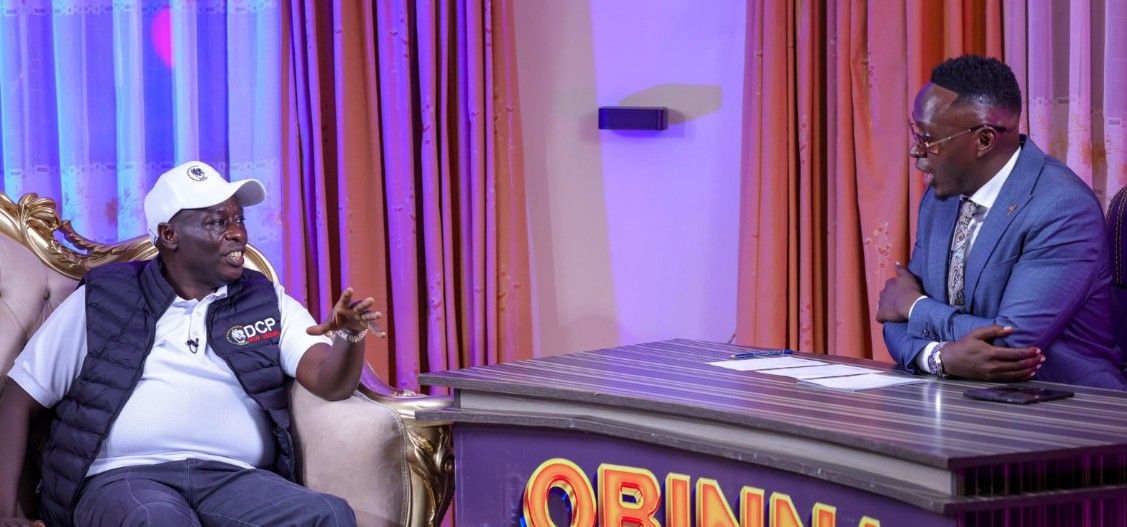Financial Realities: Gachagua softened his prior assertion of “empty coffers,” acknowledging funds were available but hindered by President Ruto’s tight control over government operations.
Wealth Allegations: He shockingly claimed President Ruto accumulated KSh 3-4 trillion within two years, sparking controversy and calls for scrutiny.
New Political Path: The launch of the Democracy for the Citizens Party (DCP) marks Gachagua’s effort to redefine his political identity, though marred by security threats.
Emotional Undercurrents: Retaining Ruto’s photos reflects the deep personal and political complexities fueling Gachagua’s current stance.
Public Engagement: The interview stirred widespread debate online, highlighting growing public interest in political accountability and insider revelations.
Rigathi Gachagua hosted on Obinna Show
A Quick Recap of This Story
A Night That Changed the Narrative: Rigathi Gachagua Speaks Out
In a deeply revealing interview aired on May 16, 2025, Rigathi Gachagua, Kenya’s former Deputy President, sat down with the vibrant and candid media personality Oga Obinna on the widely viewed Obinna Show Live. The setting was intimate yet charged with tension, broadcast live from Gachagua’s residence in Wamunyoro. The conversation rapidly evolved beyond mere political discourse, offering viewers a raw glimpse into the man behind the headlines — his disappointments, his frustrations, and his ambitions.
Gachagua’s opening remarks immediately caught attention as he revisited his past claim that the Kenya Kwanza government inherited “empty coffers.” While this phrase had echoed through political circles and media reports, the interview provided a nuanced revision. He acknowledged that although the government faced financial challenges, the treasury was not entirely devoid of funds. The problem, he suggested, lay in the internal dynamics of governance, specifically criticizing President William Ruto’s leadership style. Gachagua described a micromanagement approach that curtailed his ability to maneuver and implement policies effectively. This candid admission not only softened his previous stance but also laid bare the complexities and internal friction within the ruling coalition.
Unpacking the Allegations: Wealth Beyond Imagination
Perhaps the most incendiary moment of the interview came when Gachagua made an explosive claim regarding President Ruto’s financial status. According to him, the president had amassed an astronomical sum—estimated between 3 to 4 trillion Kenyan shillings—over just two years in office. Gachagua expressed shock and disbelief, insinuating that such rapid accumulation could hardly be reconciled with public service ethos or Kenya’s economic realities.
This allegation sent ripples across political and public spheres, igniting a firestorm of debate and skepticism. Many questioned the source of these figures, while others pondered the implications for transparency and governance. Whether seen as political maneuvering or a genuine exposé, Gachagua’s words undeniably added a new dimension to ongoing discussions about wealth and power in Kenya.
The Birth of a New Political Force: Democracy for the Citizens Party (DCP)
Away from the financial controversies, Gachagua used the platform to formally announce his latest political venture—the Democracy for the Citizens Party, abbreviated as DCP. This move marks a significant shift in Kenya’s political terrain, signaling Gachagua’s desire to carve out an independent identity distinct from the Kenya Kwanza coalition. He framed the party’s creation as a response to what he described as the disillusionment of many Kenyans with the current political order.

The launch event itself was fraught with drama. Unidentified disruptors reportedly attempted to sabotage the proceedings, a move that raised serious concerns about the security of political figures and events in Kenya. Gachagua, alongside his close associates including Oga Obinna, called for a thorough review of the security protocols surrounding the party’s activities, highlighting the precariousness of the political environment.
Personal Layers: Memories and Symbolism
Adding an unexpected emotional layer to the discussion, Gachagua revealed that he still keeps photographs of President Ruto in his home. This revelation was striking given their well-publicized political fallout. For Gachagua, these images symbolize a complex blend of nostalgia, respect, and what he described as profound betrayal. This personal touch allowed viewers to see the human side of political conflicts—how alliances can shift, yet memories and sentiments linger. It underscored the often-painful realities of political partnerships, where personal and public lives intersect in complicated ways.
Impact and Public Reaction: A Nation Listening
The interview did not just make headlines; it ignited vigorous conversations across social media platforms and political circles nationwide. Supporters praised Gachagua’s courage and transparency, viewing his words as a much-needed wake-up call about the state of governance and political honesty in Kenya.
Conversely, critics dismissed some of his claims as exaggerated or politically motivated, urging caution and fact-checking. Meanwhile, the Obinna Show solidified its reputation as a critical platform for unvarnished political discourse, drawing an audience eager to witness bold revelations from high-profile figures. The episode exemplifies the growing appetite for political transparency and the role of media in holding leaders accountable.
Read this related article: Is Rigathi Gachagua Still Eligible to Run for President After Impeachment?

0 comments
Be the first one to comment, but before that...
Here are some best practices for writing comments: